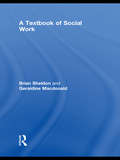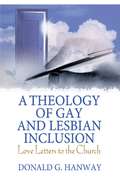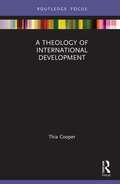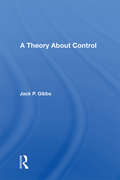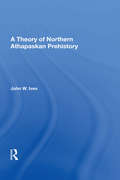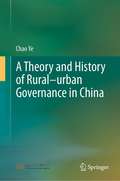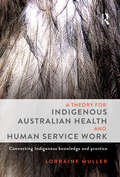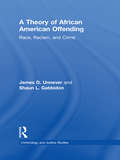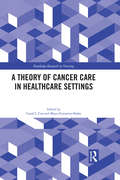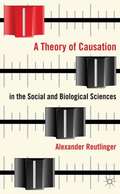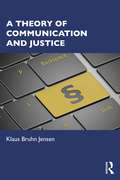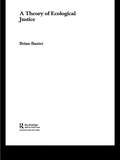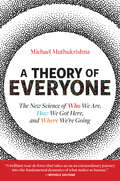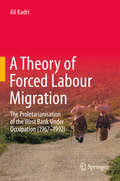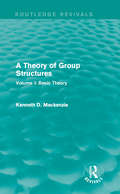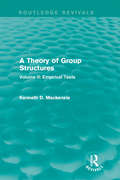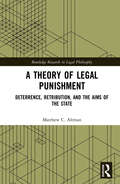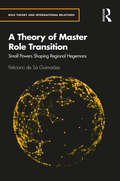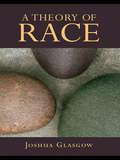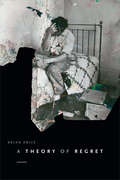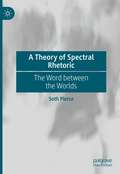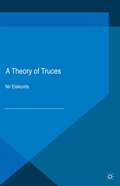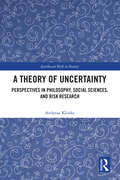- Table View
- List View
A Textbook of Social Work
by Geraldine Macdonald Brian SheldonWhere did professional social work originate from? How effective are social work interpretations in the lives of vulnerable people? A Textbook of Social Work provides a comprehensive discussion of social work practice and its evidence-base. It strikes a balance between the need for social workers to understand the social, economic, cultural, psychological and interpersonal factors which give rise to clients’ problems, and the need for them to know how best to respond with practical measures. Divided into three parts: the text covers the history and of social work as a movement and profession in the first, and social work methods and approaches in the second. The final part looks at the major specialisms, including, among others, chapters on: Children and families Youth Offenders and substance misusers Social work and mental health Disabled people Older People Providing a comprehensive guide to conceptual and methodological issues in social work and containing plentiful case studies and examples, this book is an essential read for social work students, as well as a valuable resource for practitioners and academics.
A Theology of Gay and Lesbian Inclusion: Love Letters to the Church
by Donald G HanwayEncourage the Church to address the gift of human sexuality-how to view it, how to deal with it, and how it relates to spiritualityA Theology of Gay and Lesbian Inclusion: Love Letters to the Church challenges traditional church teachings that brand homosexuality as immoral, using pertinent scripture from the central Gospel to promote a full acceptance of gay and lesbian Christians. This powerful book questions the assumption that gay Christians are morally inferior, presenting testimony from gay men and lesbians about prejudice they&’ve experienced at the hands of the Church-and its straight members. Written as a series of ten letters, the book addresses the strengths and weaknesses of the church and appeals for a new understanding and commitment to the acceptance of its gay members. From the author:The purpose of this book is to equip you, Christian warrior of the Gospel of peace, to stand against those who use the Bible to resist change-even that change of which our Lord would approve. In one sense, there is nothing revolutionary about this book. It is a book that respects tradition-but only up to a point: that point where tradition has to change, to give way to what the Holy Spirit is showing us in our day of the mind of Christ. And this is not revolutionary, because tradition has had to change before; it is a developing truth, born of the corporate experience of the children of God, and open to our claiming the exercise of our God-given gift of reason. A Theology of Gay and Lesbian Inclusion includes a series of letters that progress from establishing the purpose and credibility of the author, to developing grounding in Scripture and experience, to appealing to the reader to act as an ally of gay and lesbian Christians. The letters include: "Dear Christian Believer," which aims for the "bull&’s-eye" of the reader&’s faith "Dear Sexual Being," which offers a fresh look at a sensitive topic "Dear Confused Church Member," which discusses what gay people are "really" like "Dear Concerned Church Member," which discusses what gay people really want "Dear Bible Explorer," which discusses what the Bible really says "Dear Person Trying to Do the Right Thing," from "being" to "doing" and much moreA Theology of Gay and Lesbian Inclusion provides a friendly and informal Biblical rationale for alternatives to traditional church teachings, encouraging the acceptance of gay and lesbian people as fully moral and fully Christian.
A Theology of International Development (Routledge Research in Religion and Development)
by Thia CooperReligion and development have been intertwined since development's beginnings, yet faith-based aid and development agencies consistently fail to consider how their theology and practice intersect. This book offers a Christian theology of development, with practical solutions to bridge the gap and return to truly faith-based policies and practices. Development aims to raise the living standard of the world’s poor, mainly through small-scale projects that increase economic growth. A theology of liberation provided a critique to development practice, but a specific theology of development is still lacking, and many faith-based aid agencies have failed to adapt their practice. In applying theological thinking to development, the author argues that aid agencies need to address the entrenchment of unequal power relations, and embrace a holistic notion of development, defined by the needs of those most marginalized, instead of by a focus on economic growth. Development organisations need to consider the distinction between charity and justice, and to empower people in the Global South, paying particular attention to the intersections of race, class, sexuality, religion, and the environment. Overall this book is a powerful call to upend development practice as it currently exists and to return faith-based organizations to following Christian practices. It will be an important read for religion and development researchers, practitioners, and students.
A Theory About Control
by Jack P. GibbsMoving beyond his 1989 book, Control: Sociology's Central Notion, Jack Gibbs develops in this new book a comprehensive theory of control in all its biological, technological, and human dimensions. His treatment goes beyond conventional ideas about social control to show why self-control and proximate control are essential to understanding human interaction. He also argues that thinking of control in terms of the counteraction of deviance is insufficient. Tests of Gibbs's control theory, based on data from sixty-six countries, add credence to his claim that control could be the central notion for sociology and perhaps for other social sciences.
A Theory Of Northern Athapaskan Prehistory
by John W IvesThis book explores the conceptual basis for the events and processes in the prehistory of the Athapaskans, one of the most wide-spread peoples in western North America. The author bases his research on the premise that social structure is not passively dependent on the technological and economic bases of society, and argues that, ultimately, kinshi
A Theory and History of Rural–urban Governance in China
by Chao YeThis book divides the history of China's rural-urban relations into three stages: antagonism, integration and re-antagonism, and demonstrates that the two coupled variables i.e., policy-culture and coast-trade are the most crucial to urbanization and rural-urban governance in China from ancient times till now. From the perspective of a combination of history and geography, this book puts forward a new theory which is mainly based on Adam Smith's theory and other theories about rural-urban relationship and reinterprets the process and driving forces of evolutionary history of rural-urban relationship over 5,000 years in China. It is useful for researchers and scholars specialized in such fields as rural and urban studies, economics, geography, management and planning for reference.
A Theory for Indigenous Australian Health and Human Service Work: Connecting Indigenous knowledge and practice
by Lorraine MullerWinner of the 2015 Educational Publishing Awards Australia - Scholarly ResourceMost people of European background are not aware that they see the world through the lens of the Western tradition, but for Indigenous people, it can seem like a foreign language.Indigenous ways of thinking and working are grounded in many thousands of years of oral tradition, and continue among Australian Aboriginal and Torres Strait Island people today. Lorraine Muller shows that understanding traditional holistic approaches to social and emotional wellbeing is essential for practitioners working with Indigenous clients across the human services. She explores core principles of traditional Indigenous knowledge in Australia, including relatedness, Country, circular learning, stories, and spirituality. She then shows how these principles represent a theory for Indigenous practice.A Theory for Indigenous Australian Health and Human Service Work offers a deep insight into Indigenous Australian ways of working with people, in the context of a decolonisation framework. It is an invaluable resource for both Indigenous and non-Indigenous practitioners and researchers in health, social work, community work, education and related fields.'In today's global environment, where Indigenous Peoples continue to fight for self-determination, Muller's work is an exemplary model of Indigenous self- determination. It is bound to be a foundational model of Indigenous practice in field of health and well-being.' - Michael Hart, Canada Research Chair in Indigenous Knowledges and Social Work, University of Manitoba'Lorraine Muller's work covers some centrally important issues for those that work with Aboriginal and Torres Strait Islander people, and who want to understand indigenous knowledge frameworks.' - Dr Mark Wenitong, Apunipima Cape York Health Council
A Theory of African American Offending: Race, Racism, and Crime (Criminology and Justice Studies)
by Shaun L. Gabbidon James D. UnneverA little more than a century ago, the famous social scientist W.E.B. Du Bois asserted that a true understanding of African American offending must be grounded in the "real conditions" of what it means to be black living in a racial stratified society. Today and according to official statistics, African American men – about six percent of the population of the United States – account for nearly sixty percent of the robbery arrests in the United States. To the authors of this book, this and many other glaring racial disparities in offending centered on African Americans is clearly related to their unique history and to their past and present racial subordination. Inexplicably, however, no criminological theory exists that fully articulates the nuances of the African American experience and how they relate to their offending. In readable fashion for undergraduate students, the general public, and criminologists alike, this book for the first time presents the foundations for the development of an African American theory of offending.
A Theory of Assembly: From Museums to Memes
by Kyle ParryA vital reckoning with how we understand the basic categories of cultural expression in the digital era Digital and social media have transformed how much and how fast we communicate, but they have also altered the palette of expressive strategies: the cultural forms that shape how citizens, activists, and artists speak and interact. Most familiar among these strategies are storytelling and representation. In A Theory of Assembly, Kyle Parry argues that one of the most powerful and pervasive cultural forms in the digital era is assembly.Whether as subtle photographic sequences, satirical Venn diagrams, or networked archives, projects based in assembly do not so much narrate or represent the world as rearrange it. This work of rearranging can take place at any scale, from a simple pairing of images, undertaken by one person, to the entire history of internet memes, undertaken by millions. With examples ranging from GIFs and paintings to museum exhibitions and social movement hashtags, Parry shows how, in the internet age, assembly has come to equal narrative and representation in its reach and influence, particularly as a response to ecological and social violence. He also emphasizes the ambivalence of assembly—the way it can be both emancipatory and antidemocratic.As the world becomes ever hotter, more connected, and more algorithmic, the need to map—and remake—assembly&’s powers and perils becomes all the more pressing. Interdisciplinary, engaging, and experimental, A Theory of Assembly serves as a playbook of strategies and critical frameworks for artists, activists, and content creators committed to social and environmental justice, ultimately arguing for a collective reenvisioning of which cultural forms matter.Cover alt text: Letters from the title appear in a jumble, each colored in a blue-orange gradient. Readable title and author sits below the jumble.
A Theory of Cancer Care in Healthcare Settings (Routledge Research in Nursing and Midwifery)
by Carol Cox Maya Zumstein-ShahaThis book provides healthcare professionals with a practice theory for the care and management of patients who have been diagnosed with cancer. It explores what patients experience and how healthcare professionals can assist them in dealing with their uncertainty and fear as well as planning for the future. Unique to the book is its explication of the emerging theory, ‘The Omnipresence of Cancer’, which is set in the context of a discussion of earlier theories also concerned with cancer care. Chapters demonstrate how ‘The Omnipresence of Cancer’ has been developed, validated through research and being further tested in relation to cancer care. In particular, a chapter on philosophical reflections using theory to produce knowledge for practice is included. Each chapter provides essential background, a synthesis of the current state of knowledge, and practice examples associated with cancer care. The combination of theoretical reflection and practice examples is designed to promote comprehension and guidance on implementation of the theory, as well as recommendations for practice. This book will be of significant interest to healthcare students and professionals working in the field of cancer care and oncology, particularly healthcare professionals working in advanced practice roles and nurse educators. It is also anticipated that professionals working in pastoral care, occupational therapy, social work and radiography will be interested in this book.
A Theory of Causation in the Social and Biological Sciences
by Alexander ReutlingerThis first full length treatment of interventionist theories of causation in the social sciences, the biological sciences and other higher-level sciences the presents original counter arguments to recent trends in the debate and serves as useful introduction to the subject.
A Theory of Communication and Justice
by Klaus Bruhn JensenThis book outlines a theory of communication and justice for the digital age, updating classic positions in political philosophy and ethics, and engaging thinkers from Aristotle through Immanuel Kant and the American pragmatists to John Rawls, Jürgen Habermas, and Amartya Sen. In communication seeking to define justice and call out injustice, there is such a thing as the last word. The chapters in this book trace the historical emergence of communication as a human right; specify the technological resources and institutional frameworks necessary for exercising that right; and address some of the challenges following from digitalization that currently confront citizens, national regulators, and international agencies. Among the issues covered are public access to information archives past and present; local and global networks of communication as sources of personal identities and imagined communities; the ongoing reconfiguration of the press as a fourth branch of governance; and privacy as a precondition for individuals and collectives to live their lives according to plans, and to make their own histories. The book will be of interest to students and researchers in media and communication studies, cultural studies, political philosophy and ethics, and interdisciplinary fields examining the ethical and political implications of new information and communication infrastructures.
A Theory of Ecological Justice (Environmental Politics #Vol. 8)
by Brian BaxterIn A Theory of Ecological Justice, Baxter argues for ecological justice - that is, for treating species besides homo sapiens as having a claim in justice to a share of the Earth's resources. It explores the nature of justice claims as applied to organisms of various degrees of complexity and describes the institutional arrangements necessary to integrate the claims of ecological justice into human decision-making.
A Theory of Everyone: The New Science of Who We Are, How We Got Here, and Where We’re Going
by Michael MuthukrishnaA blueprint for a better future that offers a unified theory of human behavior, culture, and society.Playing on the phrase &“a theory of everything&” from physics, Michael Muthukrishna&’s ambitious, original, and deeply hopeful book A Theory of Everyone draws on the most recent research from across the sciences, humanities, and the emerging field of cultural evolution to paint a panoramic picture of who we are and what exactly makes human beings different from all other forms of life on the planet. Muthukrishna argues that it is our unique ability to create culture, a shared body of knowledge, skills, and experience passed on from generation to generation, that has enabled our current dominance. But it is only by understanding and applying the laws of life—the need for energy, innovation, cooperation, and evolution—that we can solve the practical and existential challenges we face as a species. A Theory of Everyone attempts to provide solutions for the most pressing problems of our collective future, such as polarization, inequality, the &“great stagnation&” in productivity, and the energy crisis.Casting a bold and wide net, Muthukrishna&’s book is a must-read for anyone interested in a better future for ourselves and for generations to come.
A Theory of Forced Labour Migration: The Proletarianisation of the West Bank Under Occupation (1967-1992)
by Ali KadriThis book focuses on labour dislocation and migration of Palestinians between 1967 and 1992. In particular, it highlights the social transformations in the occupied Palestinian territory where Palestinian labour was permitted to work in Israel from 1968 onwards. Elaborating on the results of the policy which saw a gradual increase in the number of Palestinian workers commuting daily from a negligible proportion of the actively participating labour force, to 35 percent of all employed persons, and 60 percent of all wage paid workers, the book studies this unique case which embodies characteristics from permanent migration situations not only in the de-jure, but also the de-facto sense; insofar as it embeds higher risks and reallocates resources as if it was a permanent relocation scenario. Illustrated with tables and econometric results, the book identifies the determinants and implications of migrant labour from the West Bank using two broad methodologies: the neoclassical and the historical-structural method. Each of these methods is divided into two branches: the classical divided into price determined and a choice-theoretic framework,and the historical-structural divided into dependency and Marxist theory. In order to gain a comprehensive understanding of the situation, all four perspectives are employed in the investigation. In doing so, what emerges is a structure for the book which takes shape along the different lines of migration literature. The book provides new insights into the making of wage labour and labour migration theory.
A Theory of Freedom
by Shay WelchThis book offers a liberatory conception of individual freedom that uniquely responds to the problems of social oppression and demands of the interrelatedness insofar as it pertains specifically to the social domain of activity.
A Theory of Group Structures: Volume I: Basic Theory
by Kenneth D. MackenzieFirst published in 1976, this A Theory of Group Structures is a study of the aggregation of individuals into groups, which cuts across many different social sciences. Volume one attempts to formulate a more rigorous theory of group structures by providing consistent definitions, assumptions, measures, methodology, theory and results. This book will be of interest to students of all social sciences.
A Theory of Group Structures: Volume II: Empirical Tests
by Kenneth D. MackenzieFirst published in 1976, this A Theory of Group Structures is a study of the aggregation of individuals into groups, which cuts across many different social sciences. Volume two examines a sequence of twelve experiments and reports empirical tests of the theory presented in volume one. The result is a major revision of existing research into problems of group structure and a case study in paradigm development. This book will be of interest to students of all social sciences.
A Theory of Legal Punishment: Deterrence, Retribution, and the Aims of the State (Routledge Research in Legal Philosophy)
by Matthew C. AltmanThis book argues for a mixed theory of legal punishment that treats both crime reduction and retribution as important aims of the state. A central question in the philosophy of law is why the state’s punishment of its own citizens is justified. Traditionally, two theories of punishment have dominated the field: consequentialism and retributivism. According to consequentialism, punishment is justified when it maximizes positive outcomes. According to retributivism, criminals should be punished because they deserve it. This book recognizes the strength of both positions. According to the two-tiered model, the institution of punishment and statutory penalties, as set by the legislature, are justified based on their costs and benefits, in terms of deterrence and rehabilitation. The law exists to preserve the public order. Criminal courts, by contrast, determine who is punished and how much based on what offenders deserve. The courts express the community’s collective sense of resentment at being wronged. This book supports the two-tiered model by showing that it accords with our moral intuitions, commonly held (compatibilist) theories of freedom, and assumptions about how the extent of our knowledge affects our obligations. It engages classic and contemporary work in the philosophy of law and explains the theory’s advantages over competing approaches from retributivists and other mixed theorists. The book also defends consequentialism against a longstanding objection that the social sciences give us little guidance regarding which policies to adopt. Drawing on recent criminological research, the two-tiered model can help us to address some of our most pressing social issues, including the death penalty, drug policy, and mass incarceration. This book will be of interest to philosophers, legal scholars, policymakers, and social scientists, especially criminologists, economists, and political scientists.
A Theory of Master Role Transition: Small Powers Shaping Regional Hegemons (Role Theory and International Relations)
by Feliciano de Sá GuimarãesIn this book, Feliciano de Sá Guimarães offers an original application of Role Theory. He proposes a theory of master role transitions to explain how small powers can change regional powers’ master roles without changing the regional material power distribution.Master role transition is the replacement of an active dominant master role by a dormant or inactive role located within one’s role repertoire. Guimarães argues that only a combination of four necessary conditions can produce a full master role transition: asymmetrical material interdependence, altercasting, domestic contestation and regional contestation. In each one of these conditions, a small power uses material and ideational tools to promote a master role transition within the regional power role repertoire. To test his model, Guimarães turns to five case studies in Latin America, Southern Africa and South Asia: the 2006–2007 Bolivia–Brazil gas crisis, the 2008–2009 Paraguay–Brazil Itaipú Dam crisis, the 2008–2009 Ecuador–Brazil Odebrecht crisis, the 1998 South Africa–Lesotho military intervention crisis and the 1996India–Bangladesh Ganges water crisis.A Theory of Master Role Transition is an excellent resource for those studying both theory and method in International Relations and foreign policy analysis.
A Theory of Race
by Joshua GlasgowSocial commentators have long asked whether racial categories should be conserved or eliminated from our practices, discourse, institutions, and perhaps even private thoughts. In A Theory of Race, Joshua Glasgow argues that this set of choices unnecessarily presents us with too few options. Using both traditional philosophical tools and recent psychological research to investigate folk understandings of race, Glasgow argues that, as ordinarily conceived, race is an illusion. However, our pressing need to speak to and make sense of social life requires that we employ something like racial discourse. These competing pressures, Glasgow maintains, ultimately require us to stop conceptualizing race as something biological, and instead understand it as an entirely social phenomenon.
A Theory of Regret
by Brian PriceIn A Theory of Regret Brian Price contends that regret is better understood as an important political emotion than as a form of weakness. Price shows how regret allows us to see that our convictions are more often the products of our perceptual habits than the authentic signs of moral courage that we more regularly take them to be. Regret teaches us to give up our expectations of what we think should or might occur in the future, and also the idea that what we think we should do will always be the right thing to do. Understood instead as a mode of thoughtfulness, regret helps us to clarify our will in relation to the decisions we make within institutional forms of existence. Considering regret in relation to emancipatory theories of thinking, Price shows how the unconditionally transformative nature of this emotion helps us become more sensitive to contingency and allows us, in turn, to recognize the steps we can take toward changing the institutions that shape our lives.
A Theory of Spectral Rhetoric: The Word between the Worlds
by Seth PierceThis book synthesizes Jacques Derrida’s hauntology and spectrality with affect theory, in order to create a rhetorical framework analyzing the felt absences and hauntings of written and oral texts. The book opens with a history of hauntology, spectrality, and affect theory and how each of those ideas have been applied. The book then moves into discussing the unique elements of the rhetorical framework known as the rhetorrectional situation. Three case studies taken from the Christian tradition, serve to demonstrate how spectral rhetoric works. The first is fictional, C.S. Lewis ’The Great Divorce. The second is non-fiction, Tim Jennings ’The God Shaped Brain. The final one is taken from homiletics, Bishop Michael Curry’s royal wedding 2018 sermon. After the case studies conclusion offers the reader a summary and ideas future applications for spectral rhetoric.
A Theory of Truces (Palgrave Studies in Ethics and Public Policy)
by Nir EisikovitsThis book argues that understanding truces is crucial for our ability to wind down wars. We have paid too much attention to the idea of permanent peace, yet few conflicts end in this way. The book describes how truce makers think, which truces can be morally justified and provides a philosophical history of truce making in the Western tradition.
A Theory of Uncertainty: Perspectives in Philosophy, Social Sciences, and Risk Research (Earthscan Risk in Society)
by Andreas KlinkeUsing sources from classical to modern that broach the phenomenon of uncertainty and its relation to risk, this book creates a novel approach to the recognized but theoretically often unattended issue of uncertainty.Andreas Klinke develops a new, general theory of uncertainty that provides a taxonomy of categories which are deduced from a critical inventory in philosophy, social and natural sciences, and risk research. Comprising six parts, the philosophical grounding of uncertainty sets the stage for the following philosophical and social scientific accounts and explanation of four distinctive guises of uncertainty that form a taxonomic notion and rationale: ontological, epistemological, linguistic-communicative, and teleological uncertainty. The theoretical-conceptual rumination provides a complex, differentiated view of the anatomy of uncertainty and an understanding that can be used in further theoretical and empirical research, as well as socio-political practice. The latter is delineated in the final part addressing the societal domestication of uncertainty.This book will be of great interest to scholars and students in philosophy, social and natural sciences, risk research, as well as inter- and transdisciplinary science fields.
